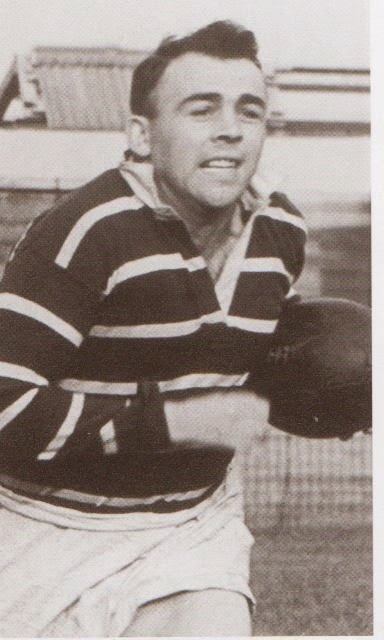It
is remarkable to note that in the 37 year period from 1921 to 1958, the vital
open side prop position was covered by basically just three players; first
Ernie Barraclough, then Frank Hemingway, then Ken Welburn. Between the three of
them they covered an astonishing 1,059 matches! It’s hard to imagine how lucky
the club was to get such dedication and
service from three successive players in the same position, the hallowed number
eight. Welburn proved a worthy successor to that shirt, and by the time he hung
up his boots after his final match in May 1958 he had given Rovers eleven years
loyal service and had just finished a successful benefit year. Although aged only
29, years of trouble with a knee injury had finally caught up with him, and 263
senior appearances, nearly all at open side prop came to an end. Ken was the
last in the line of old fashioned prop forwards whose primary function within
the team was to win much valued possession at the endless series of scrums that
was rugby league in those days. In the 1960s the laws started to change, and
soon the limited tackle rule was introduced and the game changed forever.
Over the years, Welburn formed a formidable combination for securing scrum possession with hooker Willis Fawley, and in tandem, on their day, they were a match for any in the league. A career highlight was of course the 1952 Cup final. As a local lad to be part of Rovers’ first ever Wembley visit, and relatively young at just 23, Kenny was immensely proud of this achievement. He later suffered the disappointment of defeat in both the 1955 and 1958 semi-finals. During the course of his career he also struck up a good working relationship with a number of blind side props in the form of Jack Ogden, John Daly, Fred Hulme, Bill Shreeve, Mal Kirk and Wynn Jones. A succession of broken bones and injuries took their toll. Surprisingly light on his feet for a bulky man, Kenny walked with a rather an ambling gait, and regardless of the fixture, always got through a tremendous amount of work on the field. He was made captain for the 1954/55 season, and although this honour was a recognition of his standing among his team-mates it didn’t really suit his modest and unassuming style, and after just one season gave it up. His final game for Featherstone Rovers came against Bradford in April 1958. An ill-advised later comeback ended almost before it had started with another knee injury which only confirmed the soundness of his original decision.
Over the years, Welburn formed a formidable combination for securing scrum possession with hooker Willis Fawley, and in tandem, on their day, they were a match for any in the league. A career highlight was of course the 1952 Cup final. As a local lad to be part of Rovers’ first ever Wembley visit, and relatively young at just 23, Kenny was immensely proud of this achievement. He later suffered the disappointment of defeat in both the 1955 and 1958 semi-finals. During the course of his career he also struck up a good working relationship with a number of blind side props in the form of Jack Ogden, John Daly, Fred Hulme, Bill Shreeve, Mal Kirk and Wynn Jones. A succession of broken bones and injuries took their toll. Surprisingly light on his feet for a bulky man, Kenny walked with a rather an ambling gait, and regardless of the fixture, always got through a tremendous amount of work on the field. He was made captain for the 1954/55 season, and although this honour was a recognition of his standing among his team-mates it didn’t really suit his modest and unassuming style, and after just one season gave it up. His final game for Featherstone Rovers came against Bradford in April 1958. An ill-advised later comeback ended almost before it had started with another knee injury which only confirmed the soundness of his original decision.


No comments:
Post a Comment